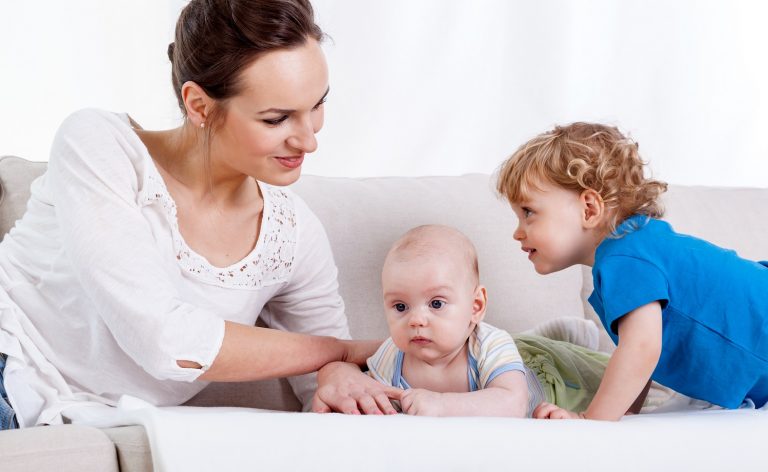More than 3,500 babies die every year due to sudden infant death syndrome (SIDS) or accidental deaths from strangulation or suffocation.
This article tells you about the ideal positions of baby’s sleep, and also gives tips on good and bad practices for a baby to sleep.
In This Article
Good Practices for a Baby to Sleep
Sleep on back
The babies are placed on their backs for naps and sleep at night. This position was found to lessen the SIDS risk in babies as it keeps airways open. NICHD labeled this is the best position for a baby’s sleep.
When the baby is involved in a night of sleep on a back position for a long time could lead to positional plagiocephaly and brachycephaly. To avoid these conditions following reposition techniques are used:
Increase the tummy time of the baby when it is awake. Get more cuddle time for the baby.
Change the position frequently like each side of the head, flattened side, etc. Cut down the time spent in carriers or car-seats. Frequently change the direction of the baby in the crib.
Sleep on stomach
Several babies love to sleep on the stomach that position is called prone position. When the baby sleeps on the stomach will lie the face on the mattresses could breathe microbes on the mattress.
The baby must suffocate when it sleeps on the stomach over a soft mattress. When the baby sleeps on the stomach could be a risk factor when the baby vomits during the sleep. It may choke due to lack of sufficient strength. In those cases, make a colicky baby sleep on the stomach to relieve the gas.
Allow the baby to play for some time after feeding and allow them to sleep in mattresses. The sleep on the stomach helps the baby for easy breathing position. It helps the baby to turn his face to the side and feel free to breathe in the nose and mouth when they sleep on the stomach.
The bad Sleeping practice which are not good for Babies
Every Room Is Your Baby’s Bedroom for the first year
Babies feel asleep over the car seat, crib, stroller, or bassinet. It is important to place your baby’s crib, play yard, bassinet, or portable crib in your bedroom for the first year. The AAP recommends that room sharing for infants greatly reduces the risk of SIDS to 50% and is much safer than bed-sharing.
Room sharing for infants provides additional benefits for easier to feed, comfort to watch your baby activities and have peace of rest in the bedroom.
Good and Bad Practices for a Baby to Sleep
Sleep Schedules Change Every Day
Babies don’t have a proper sleep schedule. During the first 6 months allow the baby to sleep for several hours. Like adults, infants have a less or more consistent sleep schedule. If they couldn’t sleep properly may feel drowsy or dumpy over the day or the next day too.
The most nap-time struggle for inconsistency is allowing the baby too early to bed when the baby is in a mood to play or too late when the baby is already more tired than he should be. To avoid this situation follow the regular baby sleep cycle helps for better health.
Baby Erratic Sleep for Granted
It is not necessary that a new baby takes time to settle into a proper sleeping pattern and you have to go without sleep until the infant becomes a toddler. Baby and mother should sleep calm and take rest that helps for both of their good health conditions.
It is better to swaddle your baby for better sleep with high-quality blankets. But remember don’t swaddle too tight may find difficulties in breathing. When you feel your baby is rolling over, then you must stop swaddling.
Regulating the child’s sleep patterns is not a child’s play. It is essential to make sure that your baby’s sleeping habits are in regular order, and they must learn to soothe themselves on their own.
As a parent, your role must be segregated like who shares the baby to sleep and who takes care for getting up at midnight. Proper communication with the baby is essential that helps the baby for calm and restful sleep.
When the baby is less than 4 months, never allow them to sleep along with you in the same bed. It increases the risk of SIDS. Mothers should avoid drinking alcohol, beverages, smoking and taking drugs during breastfeeding. It badly affects the child’s health and growth.
No Regular Bedtime Routine
Many parents do not allow babies to sleep regularly or follow a regular bedtime routine. Actually, parents are unaware of sleeping schedules and they too lost their regular sleep due to baby sleepless time.
Babies are tiny little ones. They don’t know about sleeping schedule or time, as a parent take time and prepare them for regular bedtime that helps for their overall health and growth.
A regular routine of sleep will definitely calm down the sleep of the baby and feel relax and peace throughout the sleep. Give a warm bath to baby, make the lights dim for sleep and allow a mild song for baby’s sleep will definitely increase the rest time of the baby.











